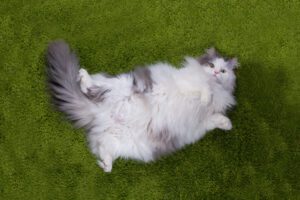Cat obesity is a prevalent and growing concern in the pet community. Approximately 60% of cats in the United States are considered overweight or obese, according to recent studies. This alarming statistic highlights the importance of addressing this issue promptly. Below in our blog, we’re going to look into the various causes of cat obesity, the potential consequences of this condition, and treatment options that can help your cat return to a healthy and active life.
At Northwoods Veterinary Clinic, we’re dedicated to providing the best care for your cat and helping you keep them healthy year after year. If you have any concerns or need to make an appointment for your cat, please reach out to us at (843) 553-0441.

What Leads to Cat Obesity? Understanding the Root Causes
Obesity in cats can be attributed to a multitude of factors, each deserving of our attention.
Excessive Calorie Intake
One significant factor of cat obesity is excessive calorie intake. After being spayed or neutered, a cat’s daily caloric requirements are reduced by 25-30%. It is important to realize that recommendations on the average cat food bag are based on studies using unneutered male cats, so feeding by the bag’s instructions is not appropriate for most cats. It’s essential to measure your cat’s food portions accurately and consult with our veterinary experts for guidance on proper feeding habits.
Excessive Carbohydrate Intake
A big difference between dogs and cats is their utilization of carbohydrates. Cats lack many enzymes that are needed to properly break down certain sugars. In sedentary cats, carbs are not used as energy sources but are instead stored as fat. Cats preferentially utilize protein for energy, so the ideal diet for a healthy cat is a higher protein/lower carbohydrate diet, which is most easily found in commercial canned cat food. While there are some higher protein/lower carb dry foods available, adding canned food to a cat’s diet while limiting or even eliminating the amount of dry food they are fed is often the easiest way to adjust a cat’s diet to accomplish healthy weight loss.
Sedentary Lifestyle
A sedentary lifestyle also plays a pivotal role in causing weight gain. Cats, by nature, are hunters, and a lack of physical activity can result in them gaining weight. Engage your feline family member with interactive play and provide as many opportunities as possible for exercise. For ideas on incorporating indoor play with your cat, visit fundamentallyfeline.com.
Underlying Health Conditions
Occasionally, certain medical conditions can predispose cats to becoming overweight or obese. Regular checkups at Northwoods Veterinary Clinic can help us identify and manage underlying health issues that may be affecting your cat’s weight.
Health Consequences of Cat Obesity
Cat obesity can have severe consequences in the form of various health problems.
Diabetes
One primary concern is diabetes mellitus, a condition more common in overweight cats. Diabetes can lead to increased thirst, frequent urination, and other complications. Proper weight management is essential to reduce the risk of this condition.
Arthritis
Obese cats are at a higher risk of developing arthritis as the extra weight places increased stress on their joints. This can result in pain and reduced mobility, affecting their quality of life.
Heart Disease and Other Issues
Respiratory issues, heart disease, and liver problems are also associated with cat obesity. Recognizing these potential health problems underscores the urgency of addressing your cat’s weight concerns as soon as possible.
How to Treat Cat Obesity
When it comes to addressing cat obesity, Northwoods Veterinary Clinic is your trusted partner. We offer tailored guidance and solutions to help your cat shed excess pounds and lead a healthier life.
Here are some key recommendations:
A Balanced, Veterinarian-Prescribed Diet
Our veterinary experts will help you create a customized nutrition plan to meet your cat’s specific needs. We’ll help you formulate a diet plan specific to your pet that best fits your lifestyle as well.
Portion Control
Precise meal portions are essential. We’ll provide guidelines on portion sizes and feeding frequency to ensure your cat receives the right amount of food without overindulging.
Exercise Routines
We’ll work with you to develop a fun and engaging exercise routine for your cat. Interactive toys and playtime can make a significant difference in their fitness.
Regular Checkups
Consistent veterinary visits are essential to monitor your cat’s weight loss progress and address any underlying health issues that may be hindering their weight loss.
Behavioral Strategies
Our team can help you identify any behavioral factors that might be contributing to your cat’s weight gain and provide strategies to address them.
Start Your Cat’s Weight Loss Journey Today
Understanding the causes and consequences of cat obesity is the first step towards a healthier future for your feline family member. At Northwoods Veterinary Clinic, we’re here to support you every step of the way. If you have questions or need guidance, please reach out to us at (843) 553-0441. Together, we can help your cat achieve and maintain a healthy weight for a happier, more vibrant life.
